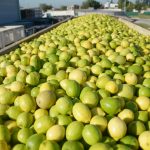Argentina: First Tucumán blueberries of the season touch down in Miami

Blueberry growers from the Argentine province of Tucumán celebrated their first air freight shipment of blueberries to the United States over the weekend, with more than 50 metric tons (MT) sent to Miami.
The fruit was sent directly to Florida in a Boeing 767 from the renovated airport in Tucumán, while a second shipment is expected this Wednesday.
At Fresh Fruit Portal we caught up with Tucumán Blueberry Growers Association (Apratuc) president Francisco Estrada, who highlighted the airport's runway extension to 3,500 meters (3,827 yards), making it the longest in the country.
"Before we had direct flights but they were in smaller planes that a lot of the time had to go with less fruit cargo to be able to arrive directly in Miami," said Estrada, who is also a member of the Argentinean Blueberry Committee (ABC).
He added the direct flights in large-capacity planes wouldn't just be for the United States but a range of global markets, particularly in Europe.
In a press release sent by the ABC, its president Federico Bayá said a long-term objective was also to consolidate the country's position in the English and continental European markets.
According to sector estimates, fresh blueberry exports are set to reach 18,000MT, representing a 5% increase on 2016.
Tucumán itself produced 8,500MT last year of which 5,500MT were exported with 74% going to the United States, 14% to England and 10% to continental Europe.
Estrada expected the export figure to be lifted to 7,000MT this campaign.
Hopes for improved prices
The executive highlighted how prices for Argentinean blueberries were "reasonable" in September in October last year, but the season peak and end coincided with supply from other parts of the world, leading to price declines.
"Particularly, last year the market was not organized with enough information to receive blueberries both from Argentina and Peru," Estrada said
"We think this made the market disorganized and meant that fruit didn't flow with enough speed, making prices drop heavily, affecting growers.
"This year we are informing markets so that they can prepare sales programs that can order a normal flow of fruit to consumers."
On that note, he said the aim this year was to have more adjusted prices without such variation between the start and finish, keeping in mind that that the international market will receive more fruit than in past campaigns.
Headline photo: www.shutterstock.com
















































